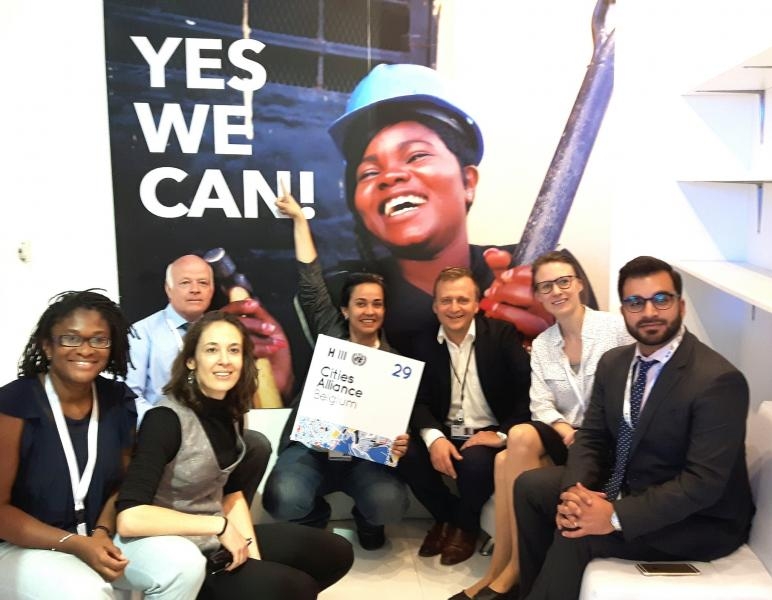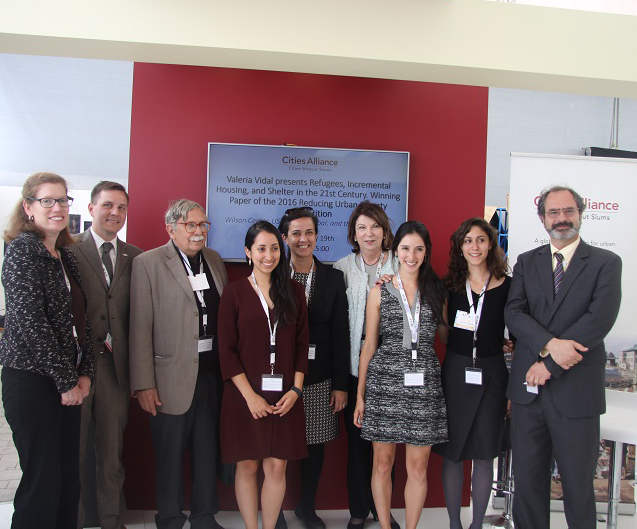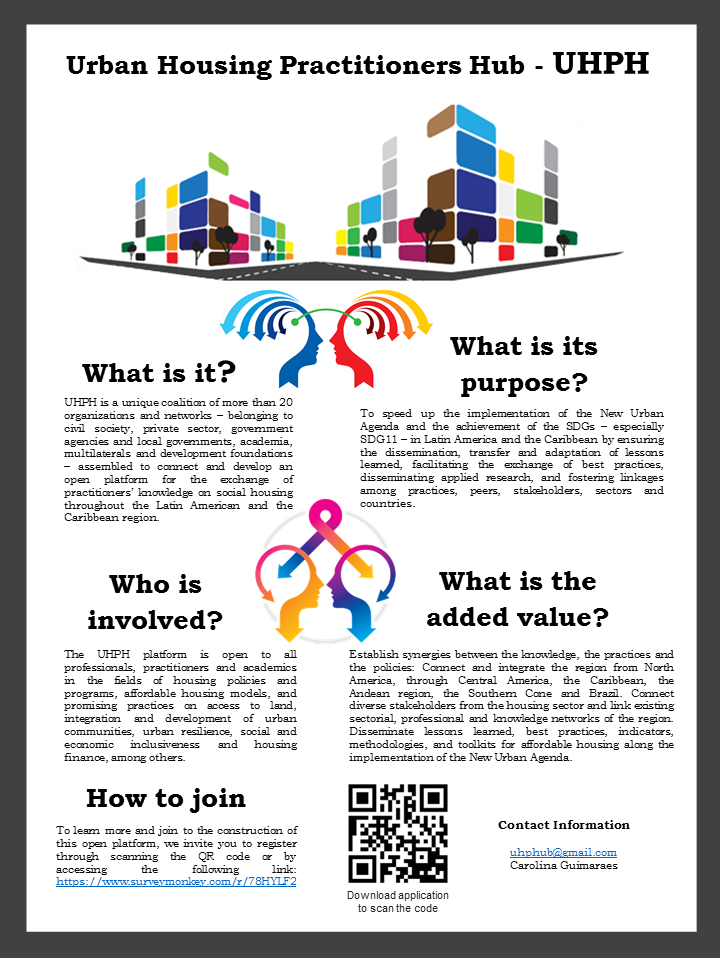[2 November 2016] -- After years of preparation, the United Nations Conference on Housing and Sustainable Urban Development (Habitat III) came to an end 20 October 2016. It is clear that Habitat III has mattered to Quito, to Ecuador, and to Latin America. The New Urban Agenda has been endorsed, and there is a strong sense of optimism and momentum as the process moves towards implementation.
The event was a resounding success for the Cities Alliance, with very good visibility for the partnership. Our colourful, energetic booth in the National Assembly hosted a wide range of events and bilateral discussions with delegations, often at a senior level.
Cities Alliance was well represented on multiple panels and networking events, with a large and diverse number of staff taking part. Clare Short, Chair of the Cities Alliance Management Board and former UK Secretary of State for International Development, was one of two external partners invited to speak at the World Assembly of Local Authorities, which was opened by UN Secretary-General Ban Ki Moon.
Cities Alliance Senior Communications Officer Priscilla Ofori-Amanfo, who oversaw and managed our booth in Quito, shared four main takeaways from the event. She highlights the vibrancy and relevance of the Cities Alliance partnership, the overall sense of conviction that the New Urban Agenda must be put into into practise, the importance of including gender (and its glaring absence at Habitat III), and, last but not least, the graciousness of the host city, Quito.
1. The Cities Alliance partnership is more vibrant and appealing than ever.
Cities Alliance’s main networking event on 18 October, represented by the Cities Alliance Joint Work Programme Habitat III and organised by the Secretariat, was hugely successful. Within minutes of the event starting, there was not one free seat in the large meeting room. Several conscientious Cities Alliance Secretariat staff gave their seats up to newcomers hurrying in and then proceeded to listen to the session from the back of the crowded room.
The networking event was entitled Strengthening partnerships – means of implementation of the New Urban Agenda, Successful partnerships and approaches ensuring inclusive, sustainable and resilient cities. With such a rich topic, the event was split into two roundtables which were dynamically and skillfully faciliated by Clare Short, Chair of the Cities Alliance Management Board.
In addition to marvelling at Ms. Short’s zest for breaking down seemingly complex issues into accessible language and her ability to capture and summarise the main points raised by all the panellists, I smiled at her wonderful sense of humour when it came to time management of the sessions.
The first roundtable, entitled Using Partnerships to Implement The New Urban Agenda at the Country and City Level was represented by the Ministry of Housing and Urban Development, Chile; Slum Dwellers International; Institute for Housing and Urban Development Studies (IHS); the Mayor of Bentol City, Liberia; and Habitat for Humanity International.
Franz Marré from the Federal Ministry of Economic Cooperation and Development, Germany (BMZ) stated in his opening remarks, “Cities Alliance is a remarkable combination of important stakeholders.” That statement stayed with me throughout the Habitat III Conference and Exhibition, as did reflections from Sarah Nandudu of Slum Dwellers International. “If we are to achieve the New Urban Agenda, it wiill only be done through partnerships. It's all about partnering with one another, not only big companies. You can also partner at local level and have an impact.”
The second roundtable was entitled The Role of Global Multi-Stakeholder Partnerships to drive New Urban Agenda Implementation. It featured the following organisations as panellists: United Cities Local Governments (UCLG); the Ford Foundation; Swedish International Development Cooperation Agency (Sida), UN-Habitat and the World Bank, with the French Ministry of Foreign Affairs leading the discussion and close of this roundtable.
Words from Xavier Briggs from the Ford Foundation convinced me that many organisations – not just those in the Habitat III Joint Work Programme – believe in Cities Alliance and are proud to be associated with this unique partnership: “The basis of a partnership is when partners bring something unique and they accomplish something together that they couldn’t do alone. Partnerships are about (i) capability and, (ii) legitmacy. Ford Foundation is proud to be a member of Cities Alliance.”
2. There is real conviction that the New Urban Agenda must be put into practise and respond to everyone's needs, rather than remaining words on paper.
The Cities Alliance booth at Habitat III was much more than a meeting point. It was a hub where like- minded individuals committed to Sustainable Development Goal 11 converged to reveal their ideas, share their excitement and agree upon the next steps for implementation of the New Urban Agenda.
It was an opportunity for specialists and the general public alike to learn more about Cities Alliance’s Joint Work Programmes, its partnership in Liberia, and the importance of secondary cities. After the Secretariat had worked so intensely for the last few months, it was wonderful to see the sessions with Cities Alliance members come to life at the booth.
On the opening day of the Conference Cities Alliance held a session entitled What policies can assist Secondary Cities to foster economic growth and development? The panellists were Brian Roberts, author of Systems of Secondary Cities which was published in 2014 with technical and financial support from Cities Alliance; Laura Cline from the U.S. Department of State and Julian Baskin, Head of Programmes at Cities Alliance.
Facilitated by Rene Hohmann, Senior Urban Specialist at the Cities Alliance Secretariat, the discussion flowed from the interconnectivity between cities, use of open data and cities focusing and specialising their economies as a concrete step towards achieving sustainability.
“We look to create partnerships in communities that include local government, NGOs and civil society. We are finding that secondary cities have more data than they realise. We have noticed the value of data to explain the shortfalls in communities’ most pressing issues. Let’s make data open so that cities can learn from each other and don’t have to start all over again. We will encourage that,” said Laura Cline.
In the booth session on Climate Action Planning for Cities: The Climate Action for Urban Sustainability (CURB) tool facilitated by Omar Siddique, Senior Urban Specialist at the Cities Alliance Secretariat, C40 Cities Climate Leadership Group, State Secretariat for Economic Affairs (SECO) and the World Bank provided us with insight into one way that cities can practically handle energy management plans.
Through the Resilient Cities Joint Work Programme, Cities Alliance has provided a grant to C40 to roll out the CURB tool in eight cities worldwide; Quito is one of these cities. As Seth Shultz from C40 noted, the first CURB workshop was actually held in Quito two weeks before Habitat III. This session focused on the practicalities, and was about, in essence, a tool that cities can use and customise on around 70 different specific interations.
“For us, CURB has become a very effective tool. We have a corporate commitment to projects that contribute to emissions reductions. We use the tool in dialogues with national and local govenments. It allows us to have a much more concrete dialogue with cities, something that we didn’t have before. It allows cities and governments to access developmental partners, such as the World Bank,”said Catalina Marulanda from the World Bank.
In my view, the popularity of the booth sessions and the desire to get things moving in countries was embodied in the discussion on Country Level Partnership for Inclusive Cities: Implementing SDG 11 and the New Urban Agenda in Liberia which was held on 19 October with participation from the Government of Liberia, Comic Relief, Slum Dwellers International, YMCA, Habitat for Humanity International (HFHI), Women In Employment: Globalizing and Organizing (WIEGO), NAPETUL, UN-Habitat and UCLGA.
Hearing from people whose lives and communities rely on the implementation of the New Urban Agenda – which translates into more public services, improved living conditions and mutual respect from authorities – was poignant. A few minutes before the session I had the opportunity to meet Irene Vance, a relatively new staff member at Comic Relief, who led the discussion and said in her opening words, “If we are talking about inclusive cities, we have to talk about communities because that’s where it all begins”.
There were positive concluding words from Honourable Stephen Neufville, Deputy Minister for Urban Affairs in Liberia, representing the Government of Liberia: “I see that through this Country Programme we are going to be one, together. We look to a future that is promising through this programme. A big thank you to Cities Alliance, UN-Habitat and Habitat for Humanity International. As a government we are open and see a need for what you are doing and the benefits to our people. We will see this programme through to successful implementation.”
3. There needs to be much more action and recognition of women's role and contributions to cities, otherwise inclusive cities can not be achieved.
"Only five per cent of Offical Development Assistance goes to gender equality and women's empowerment." - SIDA
As I was standing at Cities Alliance’s booth number 29 in Area B, Dr. Laura Lima, Urban Specialist at the Secretariat, approached me and said, “I have visited the entire exhibition area, I have gone from booth to booth and my conclusion is that very few organisations at the exhibition have a focus or component on gender.”
While the absence of other organisations pushing the gender issue at Habitat III was noticeable, the issue was very much on the agenda for Cities Alliance. As part of the Habitat III conference an Urban Library on Gender Mainstreaming in Projects and Programmes, led by SKL, was held on 17 October; Technologies and Data Gathering for the Empowerment of Women with Safetipin was held on 19 October and on 20 October, in the exhibition area, the theme for the Cities Alliance booth sessions was Gender Equality in Cities. In the morning session SKL and Slum Dwellers International presented the Results of the Gender Diagnostics of the Country Programmes, facilitated by Dr. Lima.
In the afternoon Anaclaudia Rossbach, Cities Alliance Regional Advisor for Latin America and the Caribbean, facilitated a session and book launch for a new publication: 15 Years Of The City Statute. Graça Xavier, a buoyant activist with União Nacional por Moradia Popular, said at the launch, “The right to the city is very important for black populations in Brazil, especially women.”
The Director of Cities Alliance, William Cobbett, summed up the overall perception for the people gathered at the booth: “The role of women in cities is crucial is you want anything to be achieved.”
4. The city of Quito, which hosted Habitat III, is very underrated.
The enchanting city of Quito was the setting for Cities Alliance’s participation at Habitat III. Cities Alliance Director William Cobbett led a large delegation of staff, and Clare Short, chair of the Cities Alliance Management Board, was also a key presence in Quito. The full list of the events Cities Alliance participated in is available at www.citiesalliance.org.
Despite seeing part of their city basically cordoned off due to the high security level of the conference, the inhabitants I spoke to in the city formally known as San Francisco de Quito, remained good-natured, friendly and proud that their city was hosting the event.
“ [Cities Alliance] particularly acknowledges the warm welcome from the citizens of Quito, despite the many disruptions to their wonderful city," noted Cities Alliance Director William Cobbett.
Two interesting facts that you’ll find on Wikipedia: In 1978, Quito was one of two cities first declared as a World Cultural Heritage Site by UNESCO. At 2,850 metres above sea level, it is also the highest offical capital in the world. Third non-Wikipedia fact: Despite experiencing altitude sickness which is common among first-time travellers to the city, I would recommend Quito as a place to visit. It is, quite simply, ¡chevere!
About Cities Alliance and Habitat III
Cities Alliance is the global partnership for reducing poverty and promoting the role of cities in sustainable development. Our members include multilateral organisations, national governments, local government associations, international NGOs, private sector, foundations and academia. The Cities Alliance Secretariat in Brussels is hosted by the United Nations Office for Project Services (UNOPS).
Habitat III has been a primary focus of Cities Alliance for several years.
In 2014, we created a Joint Work Programme on Habitat III focused on advocacy to rally members around cities, formulate common key advocacy messages, and determine how best to disseminate them before Quito. We have supported numerous events, especially in Latin America, that have provided a platform for knowledge and exchange to help the region mobilise for Habitat III. We have also commissioned several studies on the New Urban Agenda and provided input into the various drafts.

The Cities Alliance delegation at Habitat III.
Hearing from people whose lives and communities rely on the implementation of the New Urban Agenda – which translates into more public services, improved living conditions and mutual respect from authorities – was poignant.
“If we are to achieve the New Urban Agenda, it will only be done through partnerships. It’s all about partnering with one another, not only big companies. You can also partner at local level and have an impact.” –
Sarah Nandudu, SDI

Winners of the Reducing Urban Poverty essay competition.
Related Items:
Cities Alliance Agenda of Events at Habitat III
Agenda for JWP Equitable Economic Growth Meeting





